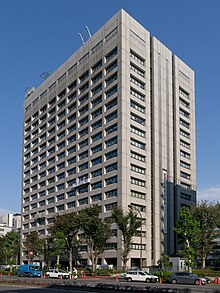Ministry of Economy, Trade and Industry of Japan (METI)
| 経済産業省 Keizai-sangyō-shō |
|
 METI Headquarters |
|
| Agency overview | |
|---|---|
| Formed | 2001 |
| Preceding agencies | |
| Jurisdiction |
|
| Headquarters | 1-3-1 Kasumigaseki, Chiyoda-ku, Tokyo 100-8901, Japan |
| Ministers responsible |
|
| Parent agency | Government of Japan |
| Child agencies |
|
| Website | http://www.meti.go.jp |
The Ministry of Economy, Trade and Industry (経済産業省 Keizai-sangyō-shō) or METI, is a ministry of the Government of Japan. It was created by the 2001 Central Government Reform when the Ministry of International Trade and Industry merged with agencies from other ministries related to economic activities, such as the Economic Planning Agency.
METI has jurisdiction over a broad policy area, containing Japan's industrial/trade policies, energy security, control of arms exports, "Cool Japan", etc. METI is known for its liberal atmosphere and officials of METI have been well known for their excellence. It is commonly called "human resource agency" for its leaders of politics, business and academia.
METI is organized into the following bureaus, offices, departments and 3 agencies (Agency for Natural Resources and Energy, Small and Medium Enterprise Agency, Japan Patent Office):
The Information-Technology Promotion Agency (情報処理推進機構) is an Independent Administrative Institution that was created in January 2004 in order to better carry out on behalf of METI certain provisions of the Act on Facilitation of Information Processing (Information Processing law, 1970 Law No. 90). The agency was created from a former Incorporated Administrative Agency of the same name (founded 1986) within the ministry. Its primary role is to promote the development and effective use of Japanese made Information Technology at home and abroad, and in addition help ensure IT's positive effect on both society and the national economy. As of the late 2000s, the agency was concentrating on improving the competitiveness of Japanese created software in the global marketplace, though the ongoing development of advanced hardware is also still considered to be of importance. The former includes the nurturing of the next generation of Japanese software developers. As part of this, it for a long time played a major role in setting and enforcing standards in the Japanese IT industry, in particular in the area of software development. In 2010 however, in a (ultimately highly unsuccessful) reorganization carried out by the then ruling party, certain functions of the IPA in this area were controversially privatized. Among other things, the Information Technology Engineers Examination Center which had been previously an important component of the IPA's maintenance of IT standards was disbanded by 2011. Various other important projects & initiatives were scrapped or severely disrupted. The IPA also has a role in helping to co-ordinate national security aspects of IT, though neglect by successive governments meant that until recently this was more apparent than real.
...
Wikipedia
